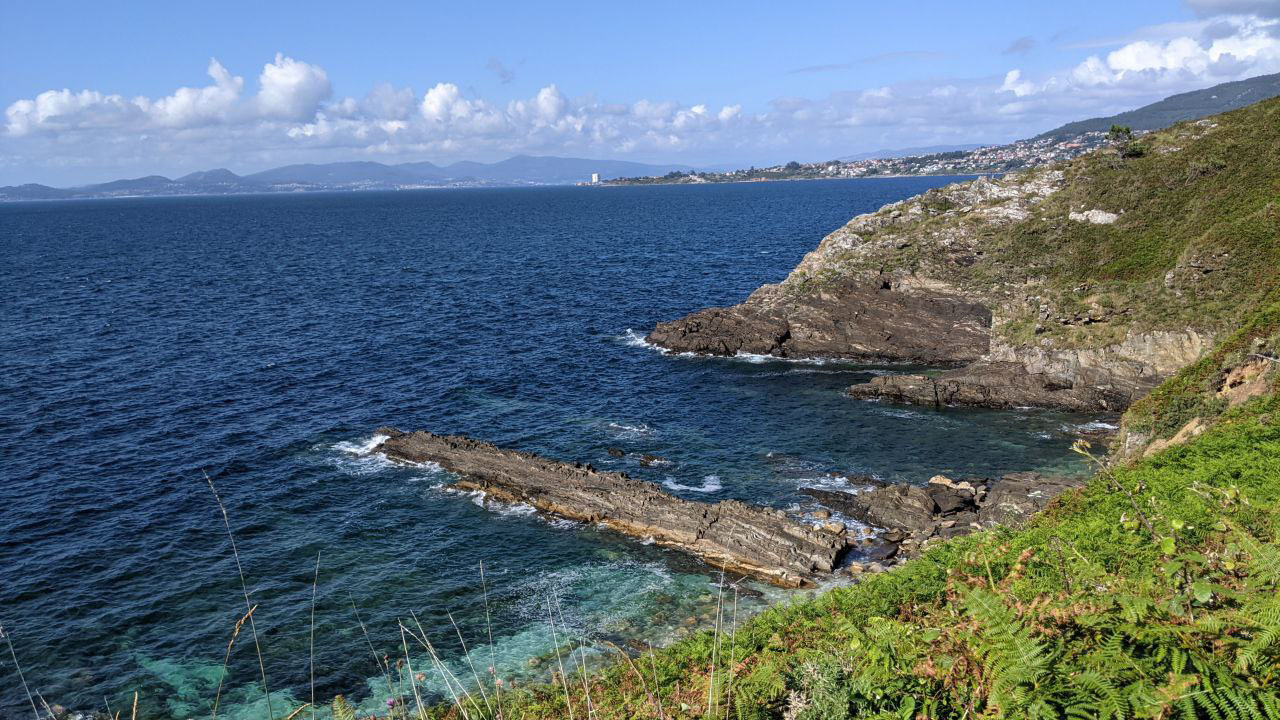spain is calling. Come and do training with us
We suggest you, your employees, and colleagues get the best training experience for your personal and professional growth. Gdoce (G12) training centre is happy to help you with this.

Gdoce is an entity focused on the design and development of training courses, online and on-site, to promote labour inclusion and educational opportunities. The organisation also provides consulting services to companies and public bodies to develop projects. The entity counts on 20 permanent staff (technicians, managers, and administrative staff), along with 40 trainers and teachers, and 600 students. Collaborates with public bodies such as the Galician regional government and local municipalities, but also with educational institutions, associations, SME companies, etc.
The activity of the organisation can be divided in different areas:
- Training: a great number of courses Gdoce provides are aimed at unemployed people and funded by public entities under the name of professionalization/vocational certificate.
- Gdoce is an employment agency, working as an intermediary entity to connect employers and workers, and in coordination with the Public Employment Service.
- Project management: national and European projects, mainly Erasmus+ (KA1 & KA2) and Erasmus for Young Entrepreneurs.
We know how to do a good European project and want to teach you!
During the last 10 years, Gdoce have successfully implemented more than 50 local and international projects.
Time to collaborate
With this presentation, we are inviting you, as a young but well-promising organisation, your employees, colleagues volunteers, and adult individuals to collaborate under the umbrella of the Erasmus+.

The Actions are expected to bring positive and long-lasting effects on the participants and participating organisations involved, as well as on the policy systems in which such activities are framed.
As regards pupils, students, trainees, apprentices, adult learners and young people come to the training entities or/and organisation to produce one or more of the following outcomes:
- improved learning performance
- enhanced employability and improved career prospects
- increased sense of initiative and entrepreneurship
- increased self-empowerment and self-esteem
- improved foreign language and digital competences
- enhanced intercultural awareness
- more active participation in society
- better awareness of the European project and the EU values
- increased motivation for taking part in future (formal/non-formal) education or training after the mobility period abroad

Learning mobility of individuals allows organisations to send pupils, students, trainees, apprentices, adult learners, and young people for training abroad. These activities involve partner organisations with different backgrounds and active in different fields or socio-economic sectors (e.g. traineeships of university students or VET learners in enterprises, NGOs, public bodies; teachers in schools following professional development courses in companies or training centres; business experts giving lectures or training in higher education institutions, etc).
While Mobility project for higher education students and staff welcomes student individuals or groups of any form of studies (short cycle, bachelor, master, and doctoral levels) as well as staff members of the organisations, universities, colleges, etc to do mobility in another country. They can carry out a traineeship in an enterprise, a research institute, a laboratory, an organisation, or any other relevant workplace. This action also supports higher education teaching and administrative staff to take part in professional development activities abroad as well as staff from the world of work to teach and train students or staff at higher education institutions. These activities may consist of teaching as well as training periods (such as job shadowing, observation periods, training courses).
How does it work?
- We agree on collaboration and partnership.
- We conduct a video call, choose topics, training centre and agree on the priorities, goals, and expectations from your side.
- With our project proposal, we apply for funding.
- We wait for the positive result and feedback from a National Agency.
- When a project is approved – the stated number of participants come to Spain and attend training.
- Our trainers deliver training at the best level, and your participants enjoy their time in Spain.
- When the project duration is over – we report about achieving our goals and receive final payment.
This action aims at reaching out to grassroots organisations and newcomers to the Programme and less experienced organisations, reducing entry barriers to the Programme for organisations with smaller organisational capacity.
It should last between 6 and 24 months.
Activities to implement:
Project management: activities that are necessary to ensure the adequate planning, implementation, and follow-up of the projects, including smooth and efficient collaboration between project partners. In this phase, activities typically include organisational and administrative tasks, virtual meetings among partners, preparation of communication materials, preparation and follow-up of participants taking part in activities, etc.
Implementation activities: can include networking events, meetings, working sessions to exchange practices and to develop results. These activities may also involve the participation of staff and learners (provided that their participation contributes to the achievement of project objectives).
Sharing and promotion activities: organisation of conferences, sessions, events aimed at sharing, explaining, and promoting the results of the project, whether they are in the form of tangible results, conclusions, good practices, or any other form.
How does it work?
- We agree on collaboration and partnership.
- We conduct a video call, choose topics, training centre and agree on the priorities, goals, and expectations from your side.
- With our project proposal, we apply for funding.
- We wait for the positive result and feedback from a National Agency.
- When a project is approved – we follow every phase of the project. We guide you through the whole process of the project and you having a nice experience in project management subject.
- When the project duration is over – we report about achieving our goals and receive final payment.
- When a project is approved – the stated number of participants come to Spain and attend training.
- Our trainers deliver training at the best level, and your participants enjoy their time in Spain.
Topics to choose:
- Emotional intelligence and stress management
- Project management
- IT
- Spanish language
- Social inclusion
- Circular economy
- Social Entrepreneurship
- Financial management
- Any other topic you would like
SPAIN IS CALLING

Also, we have departments that have accreditation and can host students with no age limits all around the country. It’s up to you, which city to choose. We suggest you the following locations:
- Vigo
- Pontevedra
- A Coruña
- Madrid
- Seville
- Barcelona
- Malaga
- Valencia
- Valladolid
- Lisbon
- Mexico
Contact information
If you are intrigued, interested or curious to know more about training opportunities in Spain – contact us and we will be happy to help you:
Miguel Caneda, head of the International Projects department miguel.caneda@postal3.es
Oksana Shamonova, project manager – oksana.shamonova@gmail.com

Reinventando juntos el entorno de trabajo
«New work culture: get equipped for more flexibility» es un nuevo proyecto Erasmus+ liderado por la Association de Gestion des Fonds Européens (Francia), en el que participa Gdoce junto a socios de Bélgica, Chipre, Italia y Polonia y que propone crear un programa de formación para formadores, trabajadores y profesionales de Recursos Humanos que deseen desarrollar sus habilidades para enfrentarse a los nuevos retos digitales del mundo del trabajo, especialmente tras la pandemia. NWC está basado en la idea de que los profesionales, trabajadores y RRHH necesitan adquirir el know-how y las destrezas y competencias sociales para adaptarse al cambiante mundo laboral. Conoce más sobre esta iniciativa aquí
Desarrollando microcredenciales para el sector de la asistencia a domicilio
MyCred4Home es una iniciativa conjunta de IPERIA (FR), STEPS (IT), CFB (BE), University of Cyprus (CY) and GDOCE (ES) para fomentar la inclusión social y profesional de perfiles poco cualificados en el sector doméstico, a través de la combinación de dos herramientas de la UE, una nueva y aún en desarrollo, las microcredenciales, y otra que se renovará en breve, la validación del aprendizaje no formal e informal.
El objetivo común es ayudar a las personas a que sus competencias sean reconocidas y valoradas más fácil y rápidamente, y transformarlas en mejores oportunidades de empleo y, por tanto, de inclusión. Toda la información en MyCred4Home.eu

El proyecto Track-Map-Clean pretende concienciar sobre los problemas medioambientales producidos por la eliminación inadecuada de residuos. Durante este proyecto, desarrollaremos herramientas educativas y digitales para trabajadores juveniles, ONGs y jóvenes con el fin de promover prácticas respetuosas con el medio ambiente y fomentar soluciones innovadoras para superar los problemas medioambientales.
Web: https://track-map-clean.eu/
Facebook: https://www.facebook.com/trackmapclean
PROYECTO ERASMUS+ SMAB
Smart Business for All SMAB es un proyecto KA220 financiado por el programa Erasmus + que cuenta con un partenariado formado por: KBT Vocational School (Noruega) Prios Kompetanse (Noruega) Startup Migrants UG (Alemania) InnovED – Center For Education And Innovation (Grecia) Stowarzyszenie ‘Euro Lider (Polonia) Markeut Skills Sociedad Limitada – MEUS (España) Clictic (España)
El proyecto SMAB tiene como principal objetivo dotar a las personas que residen en áreas remotas, y también a personas migrantes o refugiadas, de las habilidades, los conocimientos y las actitudes necesarios para iniciar su propio negocio y contribuir al desarrollo del capital humano de los países receptores.
El propósito del proyecto a largo plazo es la reducción de la marginación de los usuarios finales vulnerables debido a estereotipos potenciales, y conseguir su incorporación como miembros activos de la sociedad mediante la construcción de relaciones en los ámbitos tanto personal como profesional.
Resultados del proyecto:
- Resultado 1: Estudio de casos nacionales sobre las necesidades de la población migrante o refugiada.
- Resultado 2: Programa de formación certificado.
- Resultado 3: El Kit Profesional.
- Resultado 4: El centro de recursos
Más información aquí: